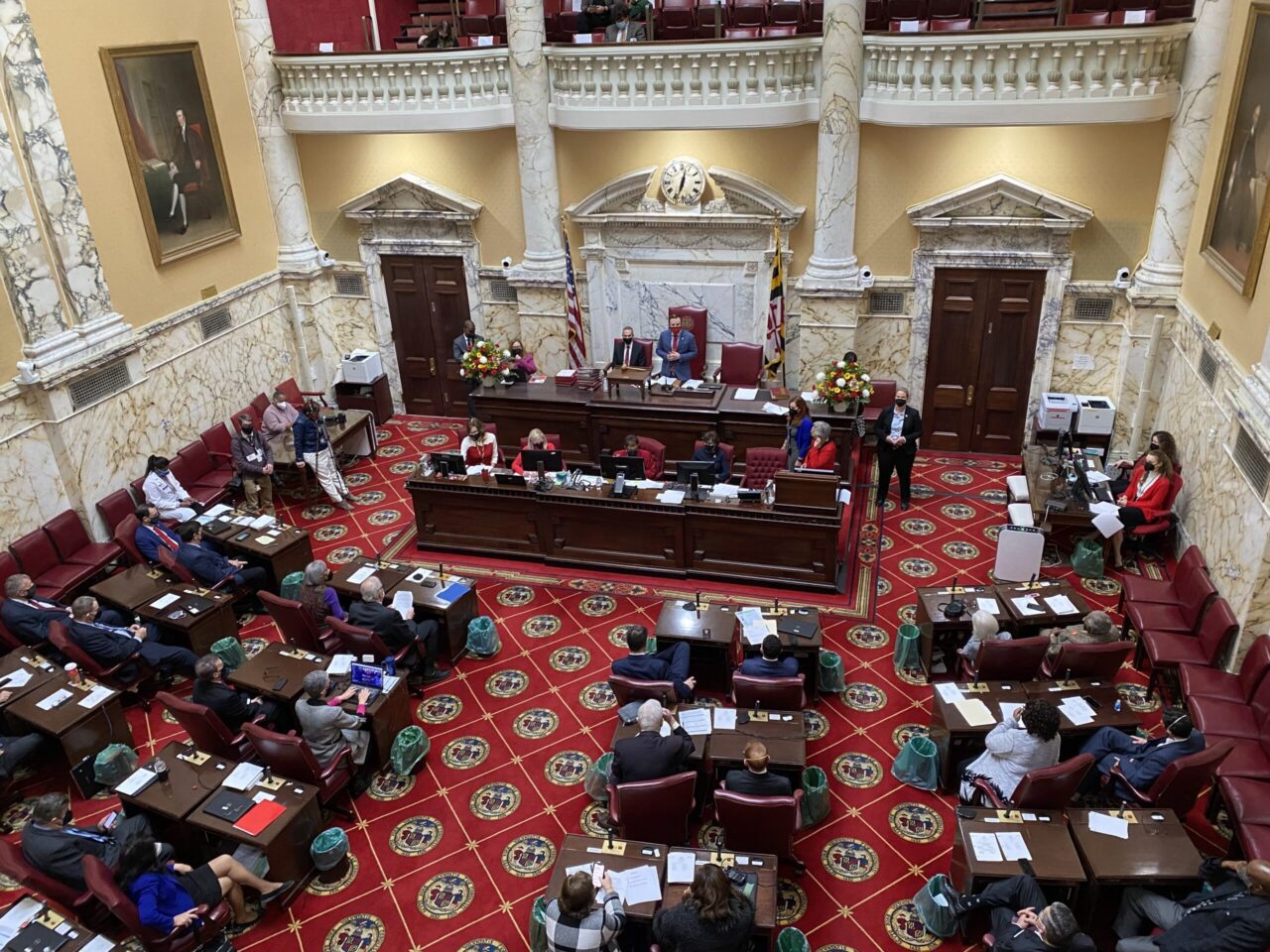Roundup: Senate Passes Abortion Bill to Governor, Panel Backs Insurer Fee, Bill Honoring Slain Officer Amended – Josh Kurtz

A view of the Maryland Senate chamber from the visitor’s gallery. Photo by Danielle E. Gaines.
The Maryland Senate gave final approval Tuesday to a bill that would expand who can perform abortions in the state and provide $3.5 million in financial support to clinically train health care professionals to offer reproductive services.
The Abortion Care Access Act, sponsored by Del. Ariana B. Kelly (D-Montgomery), passed on a vote of 28-15 — one vote shy of a veto-proof majority and is expected to be presented to the governor this week. (A Senate crossfile of the bill passed with a veto-proof majority Thursday, when more senators were present in the chamber.)
The early passage of the bill means lawmakers may have time to override a potential veto before the end of the 90-day legislative session on April 11.
The bill was passed after days of deliberation and final efforts by Senate Republicans to add amendments.
Much of Tuesday’s debate revolved around patient mental health.
Sen. Mary Beth Carozza (R-Lower Shore) offered two amendments that would have required providers to connect patients with mental health services after abortion care has been rendered.
Sen. Delores G. Kelley (D-Baltimore County), the senate sponsor of the bill, opposed the amendments and said there was nothing about the bill that would require anyone to consider undergoing mental health treatment.
“In fact, it’s actually insulting,” Kelley said, saying the proposal implied that people who need health care are unable to make that decision for themselves.
In addition to expanding the types of medical professionals who would be allowed to perform abortion services in Maryland, the bill would also make the state’s existing abortion care coverage under Medicaid permanent, and require private health insurance plans — with exceptions for those with religious or legal exemption — to cover abortion care without cost-sharing or deductibles.
Finance Committee backs health insurance fee
The Senate Finance Committee voted on Tuesday to extend a tax on health insurance companies that has been credited with stabilizing Maryland’s individual health insurance market.
The measure, House Bill 413, would keep the 1% tax on insurance providers in place for another five years. The money raised, an estimated $135 million per year, would go into a fund that that insurers can tap when individuals require expensive care.
The vote was 7-3, with Democrats voting for the bill and Republicans voting against it.
Enrollment in the individual market grew following passage of the Affordable Care Act, but plummeted after consumers were hit with hefty premium increases in back-to-back years. The drop led to fears that the individual market could end up with too few healthy people to be solvent.
Sen. Pamela Beidle (D-Anne Arundel) told her colleagues on the finance panel that Maryland must extend the tax this year to avoid the loss of federal matching funds. “If we want stability in the reinsurance fund, we need to do this, and we need to do it this year,” she said. “Next year is too late.”
Gov. Lawrence J. Hogan Jr. (R) supports the extension. The measure passed the House of Delegates along party lines, 97-40, earlier this month.
Bill named for slain Baltimore officer amended
In a rare move, the Maryland Senate approved an amendment on the chamber floor Tuesday that dramatically changed the scope of a bill named in honor of slain Baltimore Police Officer Keona Holley.
As passed by the Judicial Proceedings Committee, The Officer Keona Holley Public Safety Act, sponsored by Sen. Robert G. Cassilly (R-Harford), would have made people ineligible for parole if they were convicted of conspiring to, attempting to or committing the murder of a police officer because of their profession.
Carter’s amendment turned the bill into a scholarship program for Holley’s four children, providing state funding for them to go to any two- or four-year institution either in- or out-of-state.
In explaining her concern about the bill’s original intent, Carter said Holley was “absolutely heroic” but the legislation was “bad policy, philosophically,” and “very awkwardly drafted.”
She pointed to a measure in the bill that would allow someone to face a life without parole sentence if the defendant “suspects” the target of a homicide is a police officer. Carter said there is no other place in Maryland’s criminal code that uses that term when deciding the intent behind a crime.
Carter also said that the bill as originally drafted would have made police officers “elite” among other people and professions.
“Any murder is heinous, no matter who the victim, but I don’t think the right policy for Maryland is to create standalone offense for a person based on their profession,” she said.
Cassilly said the state is facing a staffing “crisis” among law enforcement.
“[The bill] sends a strong message that the state stands behind you, stands behind your loved ones, it stands behind their families,” he said. “…The conduct this bill prohibits is actually intolerable in a humane society in a just society, in a society that wants to flourish as ours does.”
Carter’s amendment passed on a vote of 26-16 and the bill received preliminary approval. If given final approval by the Senate, the bill faces a long road to passage before the end of the legislative session, including a hurdle that late-arriving bills in the House must pass before going to a hearing.
In an interview after the floor session, Carter said that the original bill would have also made second-degree murder, domestic assault and conspiracy to commit murder convictions ineligible for parole, and could coerce innocent people into taking plea deals for crimes they didn’t commit.
“I don’t believe in life without parole,” Carter said. “I believe in judicial discretion and I would challenge anyone to look at where there’s a first-degree murder of a police officer and the person has not been sentenced to life without parole.”







